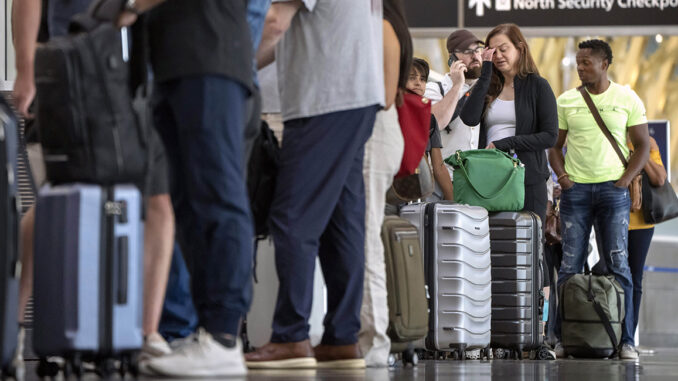

SAN FRANCISCO – “Move fast and break things,” the high-tech slogan popularized 20 years ago by Facebook founder Mark Zuckerberg, was supposed to be a rallying cry for innovation. changing games. Now it seems like a good thing for a society that sits on a digital infrastructure that is too fragile to tolerate a flawed software program that was supposed to help protect computers – not destroy them.
The worldwide tech outage caused by a flawed update installed earlier this month on computers running Microsoft’s Windows software known by cybersecurity expert CrowdStrike was so bad that other businesses were affected, such as Delta Air Lines , which were still recovering from it days later.
Advertisements

“We’re completely dependent on systems that we don’t even know exist until they break,” said Silicon Valley expert and historian Paul Saffo. “We’re almost like Blanche DuBois in that scene from ‘A Streetcar Named Desire,’ where she says, ‘I’ve always relied on the kindness of strangers.’
Dependence – and extreme vulnerability – begins with the connections that bind our computers, phones and other devices. That often makes life easier and more convenient. However, it also means that outages can have far more serious consequences, whether they are caused by a mistake like the one made by CrowdStrike or by the malicious intent of a hacker.
“It might be time to examine how the internet works and ask yourself why it works the way it does. There are a lot of rubber bands and shoelaces that hold things together,” said Gregory Falco, deputy of engineering professor at Cornell University.
The risks are being compounded by consolidating the control of the corporate world best known as “Big Tech”: Microsoft, whose software runs most of the world’s computers; Apple and Google, whose software powers almost all of the world’s smartphones; Amazon, which oversees the data centers responsible for keeping websites running (another important service provided by Microsoft and Google, too, in addition to its e-commerce bazaar); and Meta Platforms, a social media platform with Facebook, Instagram and WhatsApp.
It is a highly centralized government with few corridors open to a network of small companies such as CrowdStrike – a company with $3 billion in annual revenue, a fraction of about $250 billions in annual sales that Microsoft falsifies. All major stakeholders are prioritizing the pursuit of profit over the commitment to quality, said Isak Nti Asar, associate director of the cybersecurity and global policy program at Indiana University.
“We’ve created a cult of innovation, an approach that says, ‘Get technology into people’s hands as quickly as possible, then fix it when you find a problem,'” Nti Asar said. seek better technology instead of surrendering to these feudal lords.”
But is Big Tech to blame for this situation? Or is it 21st century society that has recklessly allowed us to get to this point – consumers eagerly buying their next shiny gadget while happily posting photos online, and legislators who seemed excessive chose to impose security?
“Everybody wants to point the blame somewhere,” said Saffo, “but I’d say you better start looking in the mirror.”
Do we need to change the way we live if our digital infrastructure is not working properly? Or could that happen when some credit card companies charge their customers if they want their monthly statement mailed to them via a non-US mail service? known as “snail mail” because it travels so slowly?
Staying in the loop worked well for Southwest Airlines during the CrowdStrike snafu because its system has been running on Windows software since the 1990s. It’s such an old technology that Southwest doesn’t rely on CrowdStrike for security. That sword has another very unpopular side: Behaving like a Luddite out of Southwest during the 2022 holiday season when thousands of its flights were canceled because its technology couldn’t handle it. to change the schedule of employees properly.
But it’s still impossible to go back to the analog and early digital era of 30 or 40 years ago when most jobs were done by hand, and most records were handled with pen and paper. The technology seems destined to become even more widespread as artificial intelligence appears to be on the verge of automating many tasks, including writing the code for software updates that another computer will oversee to make sure it’s not work well.
“There’s a surprising realization that some of the things we used to make fun of, like putting a password on a Post-It, aren’t the worst idea,” said George Mason University’s Matt Mittelsteadt.
#grip #technology #modern #life #pushing #people #direction #digital #landmines #North #State #Journal